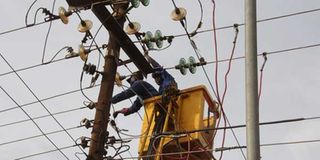Sparks fly as graft claims, power rows hit geothermal firm

Kenya Power employees carry out routine maintenance in the past. PHOTO | JOSEPH KANYI | FILE
What you need to know:
- Multi-billion-shilling energy company with Sh64.2bn asset base has lately been in the news
- More than 70 MW of power that should be transmitted to Mombasa remains unused at Olkaria.
Questions have been raised about allegations of misappropriation of funds facing the Geothermal Development Company, with fears rife that they border on control tussles among industry players with the aim of keeping financiers of its mega projects away.
The multi-billion-dollar energy development company, with an asset base of Sh64.2 billion so far, has been in the news for a while over reports of maladministration, which its management has denied.
There is fear that financiers may shy away from funding geothermal development projects through the company as a result.
Interestingly, both the Auditor General and the Public Procurement and Oversight Authority seem to have given the company a clean bill of health. The former cleared the firm’s accounts while the latter has not stopped any of its procurement processes on account of impropriety or failure to follow procedures.
Not even its successes in bringing down the cost of power in the country, in line with its mandate, has saved the company from the allegations haunting its top management.
Managing director Silas Simiyu has stepped aside to allow for investigations and is awaiting the verdict of the EACC and the Director of Public Prosecution after he was named in a corruption dossier which President Kenyatta delivered to Parliament three weeks ago.
Last year in May, board chairman Simon Gicharu was moved to Rural Electrification Authority following board feuds that erupted in the media and Parliament.
Mr Gicharu has swapped jobs with Mr Faisal Abass, who was given a three-year term as GDC chairman from REA, where he headed its board.
The company is currently implementing a Sh9.6 billion fund from Kfw. It is also in the process of finalising a major funding by India’s Exim Bank of US $200 million and US’ Exim Bank of $300 million.
VESTED INTERESTS
It has now emerged that the pressure facing GDC’s management to leave office was being fuelled by vested interests by energy operatives keen on taking control of the multi-billion shilling firm.
Records show that the firm has a funding potential in excess of Sh180 billion in form of commitments and pledges, both from the government and development partners. This has generated a lot of interest in the mega-dollar geothermal industry.
Fingers are pointing at diesel power generation operators who are said to be losing money as they increasingly generate less electricity due to increased uptake of geothermal power.
GDC says it has been able to secure massive funding from development partners by demonstrating that geothermal energy was a practical solution to Kenya’s power problems.
“GDC’s consistency in meeting its targets and obligations has made donors have faith in the geothermal strategy. Hence they have continued to fund its activities despite the noise playing out in the media,” an internal GDC document seen by Sunday Nation says in part.
We also learnt that some vested interests are by investors and former bosses of the energy industry who are hell-bent on frustrating progress, resulting in conflict of interest that has sucked in a section of the management.
The internal document says GDC has lived up to its core mandate of reducing the cost of power generation in Kenya by Sh64 billion annually. The argument is that Kenya has been spending Sh44 billion every year on purchase of diesel for power generation and an additional Sh20 billion on electricity generation costs from diesel.
The government recently reduced the total diesel-generated power transmitted to the national grid from 38 per cent to 10 per cent. It is understood that the intention is to get this to 3 per cent, giving some investors in the sub-sector sleepless night.
MUSIC TO THE EARS
According to GDC, the savings that accrue from innovative geothermal power development and the resultant cheaper electricity tariffs should come as music to the ears of Kenyans and investors. “But some detractors would not want GDC to be celebrated.”
The current drop in the cost of power is due mainly to lower fuel cost charges — after replacement of diesel fuel with steam. But this attribution is hardly made, hence the concerns.
The company has been in the spotlight, even in Parliament where MPs have questioned its contribution to the national power grid over the years and criticised its performance in the energy sector.
Some MPs have even claimed that the firm — established to fast track development of geothermal resources — has nothing to show for all the resources invested in it.
The company is 100 per cent owned by the government and receives funding from the Exchequer in annual budgetary allocations. It also enjoys loans and grants from the government.
Another claim made in the past is that although GDC has 59 geothermal wells in Olkaria, with an estimated potential of 409 megawatts, the wells are not generating any power for the national grid.
In its response, the company says transmission of power from Olkaria to the coast has remained incomplete for the past three years due to ‘politically instigated community unrest”. Thus, more than 70 MW of power that should be transmitted to Mombasa remains unused at Olkaria.




